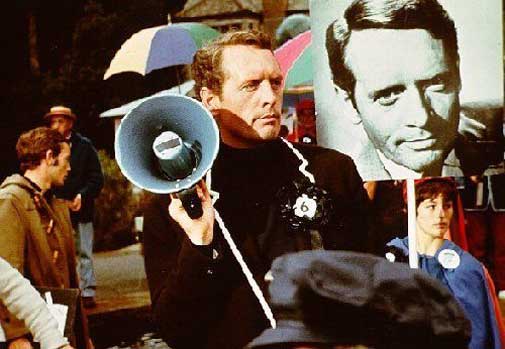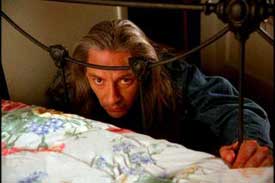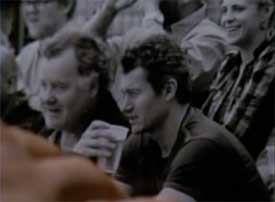
NBC is premiering The Event this month -- specifically, Sept. 20 at 9 p.m. ET. Gauging from the pilot, it promises to be the next series to cryptically bind seemingly unrelated threads into a larger conspiracy, where we won't know who is on what side, or who is exactly doing what to whom, for quite a while.
In the tradition of X-Files and Lost, The Event should be a brain twister, but, we all hope, will deliver at a faster pace without requiring years of mind-numbing persistence to find out that, um, (you poor Lost victims) everyone was dead in the first place. (The producers of The Event already have promised a speedier delivery of pertinent clues.)

The pilot episode of The Event is a well-written, fast-paced ensemble mystery involving a) the President; b) a group of scientists held at a dark, icy base in Alaska; c) some ordinary citizens who have stumbled upon things they shouldn't have; and d) the now standard-issue sketchy Presidential aides who know things the President does not.
We'll see if The Event has the mojo of series like Lost, The X Files and before those, the granddaddy of all Gardens of Discontent, The Prisoner (the original series, the one adapted by and starring the late Patrick McGoohan, and first shown in the States in the summer of 1968).
The Prisoner (shown in photo at the top of this column) followed an ex-government agent held against his will in a deceptively pleasant resort-like setting by an unknown authority determined to break his will and spirit. McGoohan's character, referred to as Number Six ("I am not a number! I am a free man!"), outwitted and subverted the system weekly, but without knowing why he was being held, or by whom.
Mysteries such as Fox's Millennium (1996-99, created by Chris Carter of X-Files) followed a secret government group -- or a legit group gone rogue -- sometimes swerving into weird paranormal territory, and always stocked with plenty of deviant behavior.
Honestly, during the last year of that series, my fatigue trumped my curiosity, and I never got resolution. And neither did Millennium. After injections of supernaturalism, and exploring the Millennium Group at higher levels, the series was cancelled, and never made it to the real millennium.

Both Millennium and its oddball uncle, 1990-91's ABC classic Twin Peaks (the latter co-created by David Lynch), had hauntingly styled but time-sucking story arcs with a lot of misdirection, identity switches and such, and basically demanded rigorous loyalty if weekly clarity were to be had. We always came back, though, because... well, there's something out there, as X-Files always warned us. Exactly was IT was took years to discover, and often without much of a payoff.
These shows, and others, seemed like things were being improvised as the writers went along, becoming snarled in shark-jumping plot twists (remember when Killer BOB arrived in Twin Peaks?) until they exited prematurely, either cancelled abruptly or going out more or less Sopranos-style -- with few clues to a supposed end, and leaving behind more questions than they answered.
To be sure, the world of conspiracy, unexplained events and free-floating paranoia is intriguing stuff. (We're videotaped dozens of times a day by security cameras, everywhere. You may be being watched right now. Look around. Or maybe you shouldn't.)

Currently, I'm hooked on the richly detailed quietude and disturbing alienation created in AMC's Rubicon. There are characters alone in rooms a lot -- as are we all -- and the shots often are held a few uncomfortable extra seconds, to give that extra space for the mind to wander through all the possible threads of the story.
No explosions, no machine guns... but perhaps more of a real dystopia than all of the Area 51s put together in The X Files. And that fully acknowledges how twisted up in its own plot Rubicon is, because I finished the first episode not knowing who these people were, what they were doing or why they were doing it. After the fifth episode, some answers are coming (the series continues Sunday nights at 9 p.m. ET), but it's so intelligently done, I'm happily in the dark.
Writers of Rubicon and The Event know they must owe Franz Kafka's 1925 novel The Trial big-time. Persecuted Joseph K. had no idea why he'd been singled out for punishment, or the supposed crime he had committed, or who, for real, was the Puppet Master orchestrating the whole thing, and what HIS agenda was. For my money, there is no better Puppet Master than Martin Landau as Bela Lugosi in the 1994 Tim Burton movie Ed Wood. See "Bela" Pull De Schtring! here:
My sense is that these series appeal to the conspiracy theorist deep within us all. With world-wide financial collapse, private security squads and the Kardashians, it all feels like somebody MUST be behind all of the madness. Someone MUST be in control of this stuff, because it couldn't possibly just exist on its own. It's too weird.
At a deeper level, while The Prisoner was a Cold War piece positing no difference between the two military-industrial complexes, it also reflected on being bound at a more basic level in Number Six's Village... by school, career, family -- society.
Its moral was that we were pretty much voluntarily imprisoned on our own, and that it was up to the individual to define and find his or her real freedom. Rubicon further blurs the lines by placing the enemy (terrorist extremism) oceans away from everyday life in the U.S., witnessed only in grainy surveillance video. Yet we're no less trapped, and obsessed and oppressed, by the threat of it.
Cable series have to move a little faster now, with many in the ten-episode season format. For paranoia fans, that's good. For those of us not particularly thrilled by having to invest years in sorting out Killer BOB, The Millennium Group and others, let's hope The Event really will evolve -- swiftly -- into a TV event Worth Watching.